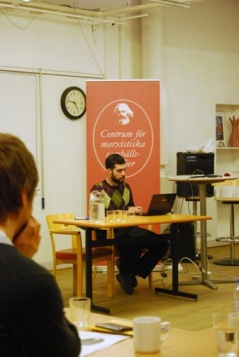The Swedish transform! member organization CMS (Centre for Marxist Studies) organized the one-day seminar “Strategies of the Left in a Precarious World” on 16 February 2013. It took place at Kafe Marx at the headquarters of the Swedish Left Party, where also the office of CMS is located. Various inputs from diverse perspectives were given by participants from all over Europe.
What are “precariousness” and “the precariat”?
Mikko Jakonen, a Finnish academic and activist introduced the term ‘precariousness’ and presented the theoretical framework. Precariousness as the insecurity of lives and labour and the absence of work protection is not a “new“ phenomenon emerging only in the post-Fordist phase, but a rather old one. The background to nowaday’s precariousness is indeed a shift from Fordist to post-Fordist, from welfare to workfare societies, i.e., the neo-liberalisation of work and lives. We have seen the rise of knowledge work and the decline of industrial work in western societies, at the same time a proletarianization of the middle classes, turning whole generations into a new precarious underclass. This is accompanied by the development of new modes of production, new products like IT and creative industries – a process of opening up the production sector, the escape from the factory to a possible self-organization of work. This also results in new organization of time, with the separation of working time and free time being removed in a new life rhythm.
All this is accompanied by a crisis of left-wing and trade unionist policies (how to organize the class?) as well as by a generation gap (organized older generations, unorganized youth living in precarious conditions).
The modern “movement against precariousness” had its origin in Italy where in 2003 a “EuroMayDay” was launched initiated by groups of “chain-workers”. These precarious parades on 1 May had been spreading over Europe relatively fast and being rather queer and unconventional had only little in common with the traditional workers’ marches. Those mobilizations are manifestations of new workers’ subjectivity, with one slogan being “The precariat is a new proletariat”. The question arising was whether the struggle was to re-gain old rights, stable jobs etc. or to fight for completely new rights.
For young generations this new precarious labour is already a kind of “natural state”. In a hierarchical system of the precariat there are winners and losers. The new middle class is young, works flexible hours, atypically or self-employed, while the new underclass is entirely deprived of any rights. It remains a sad fact for both that solidarity and organization of labour struggles become difficult or even impossible: on the precarious labour market everybody fights each other.
In order to fight the individualisation and isolation, a common demand of the precarious movements has been the basic income.
Regarding the concept of the basic income, a basic energy security concept has been developed by the Austrian CP. Barbara Steiner from transform! Austria introduced this concept as a possible strategy against the increasing energy poverty, i.e., the lack of basic energy supply, combined with an ecological approach.
Another growing problem is the privatization of housing and the trend towards a shrinking of the commons. Edvin S. Frid from the CMS presented his study on the housing situation in Stockholm. The housing policies to convert public rentals into private condominiums have led to shortage of housing, high prices and social and ethnic segregation.
How difficult it is to organize precarious workers has been mentioned before, a successful example being given by Erik Helgeson, temporary dock worker and unionist himself, who presented the organization and labour struggle strategies of “casual dock workers” in Gothenburg harbour. Casual dock workers represent a unique form of temporary labour in Sweden, because only in ports you can be employed temporarily for an unlimited period. The dock workers have developed a system becoming independent of the goodwill of their employers, distributing the work themselves with a list along a wheel for the jobs combined with seniority/priority lists.
Cornelia Hildebrandt of the Rosa Luxemburg Foundation presented Results of 10 years of neoliberal laws in Germany. Although the government’s discourse has been “we are the winners of the crisis” and in spite of the silence of the movements dealing with social questions the Germans are in a permanent crisis. The (social democratic) turn to neo-liberalism, the Hartz IV laws in particular, have completely and lastingly destabilised the social system. Wages have been dropping for years, while temporary working contracts have been increasing rapidly, especially in the export-industry, the foundation of the “German miracle”.
Examples of extremely fast precarisation since the outbreak of the crisis are the countries under the “supervision” of the Troika. Stavros Panagiotidis from Nikos Poulantzas Institute presented the Greek situation. The austerity measures imposed brought about rising unemployment, especially for the young, the impoverishment of large parts of society and the abolition of nearly all relevant workers’ rights. Solidarity networks, whose concept is an equal participation in dignity and resistance instead of charity, are described as laboratories for changing the notion of organizing one’s own life, of encouraging self-empowerment and -organisation.
Cristina Andrade from cul:tra gave a historical overview of labour struggles in Portugal followed by a presentation in greater detail of the recent situation of precariousness and crisis. In Portugal, a broad movement against precariousness has emerged since 2003, protesting against insecure and poorly paid jobs, fake independent labour and unpaid internships. Portugal is being the “model student” of the Troika. But the protest movement against the precariousness of lives and the austerity measures is growing.
Find some of the speakers’ contributions on the right (documentation).
